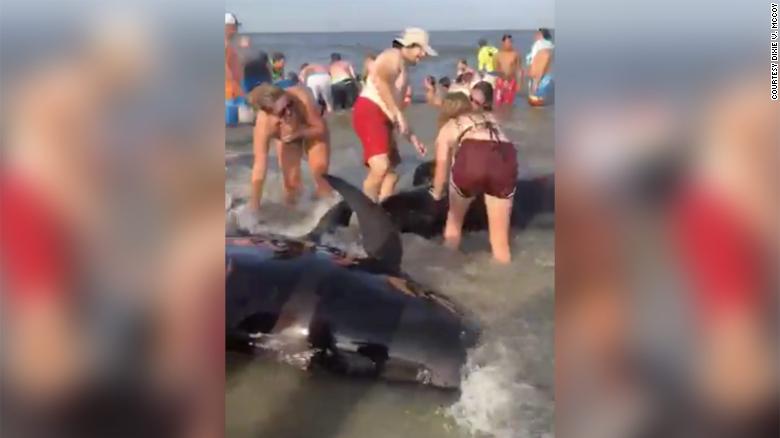Dozens of beachgoers helped save a pod of beached whales
---------
Pilot Whales in Georgia Are Saved From Being Beached
After a pod of whales washed up on the shores of St. Simons Island, dozens of beachgoers raced to push them out to sea.

The camera panned to the water’s edge on St. Simons Island’s East Beach in Georgia, where a row of short-finned pilot whales writhed, clicked and whistled as their shiny black bodies caught breaking waves in the late afternoon light on Tuesday.
“They’re going to die if they don’t get help,” said a woman’s voice on the video.
The woman, Dixie V. McCoy, who had her 2-year-old granddaughter in one arm and her phone in her other hand, recorded the scene on Facebook Live, capturing dozens of beachgoers and lifeguards surrounding the flailing pod of whales, shoveling water onto the animals with cupped hands. Some waded chest-deep into the water, Ms. McCoy said, despite shouts of shark sightings from the shore, to heave the creatures back out to sea.
“They were just so willing to help those poor whales,” she said. “It was a spectacular moment.”
In all, nearly 50 whales swam into shallow waters and as many as six caught in the surf were pushed back successfully, according to a spokesman at the Georgia Wildlife Resources Division, part of the state’s Department of Natural Resources and one of the first organizations that arrived on the scene to help with the rescue.
ADVERTISEMENT
Three of the whales died, including one that had to be euthanized, he said.
On Wednesday afternoon, harbor pilots located the pod of more than 40 whales in the Brunswick shipping channel. A group from the National Marine Mammal Foundation monitored the whales by boat.

“We’re cautiously optimistic that the group dodged a bullet, and that they’re now on their way to deeper water,” said Clay George, a biologist for the Georgia Wildlife Resources Division.
Crews had also flown a helicopter above the area, which is about 90 miles south of Savannah, and determined no other whales were stranded.
Pilot whales are essentially large dolphins, and can grow to 24 feet in length and weigh 6,600 pounds.
Speaking to reporters on Wednesday, Mr. George said they were still investigating why the animals rushed to shore, an event he called “exceedingly rare in Georgia.”
ADVERTISEMENT
Mr. George described the whales as “one- to three-ton dolphins.”
“They’re so social that if one animal in the group gets injured or sick, all the other animals in the group can follow them great distances into shore,” he said, “and then they can strand.”
Normally these creatures swim 100 miles offshore, he said, which means “something went wrong,” possibly days or weeks ago.
In the necropsy, Mr. George said researchers will be looking for ingested plastic, evidence of plastic netting or signs of an acoustic disturbance, like bombs or sonars, that could have caused one or more of the animals to swim toward land.
“Tomorrow will be the beginning of a process that could go on for potentially weeks,” he said.
Normally, added Mr. George, he would not advise humans to intervene with pilot whales, but in this case, “it was the right thing to do.”
Dr. Erin Fougeres, who administers the marine mammal stranding program for the Fisheries division of the National Oceanic and Atmospheric Administration in the Southeast, said that “mass strandings of pilot whales aren’t entirely uncommon for us.”
There have been about 23 mass strandings in Southeastern states since 1991, mostly along the Gulf of Mexico, but never in Georgia, she said.
The most important thing to do if you see a stranded mammal, Dr. Fougeres said, is to contact experts with NOAA by calling 1-877-WHALE-HELP in the Southeast, or through the agency’s “Dolphin and Whale 911” app.
ADVERTISEMENT
“This event, so far, and fingers crossed, has had the best possible outcome,” she said. “We don’t often have happy endings.”

No comments:
Post a Comment